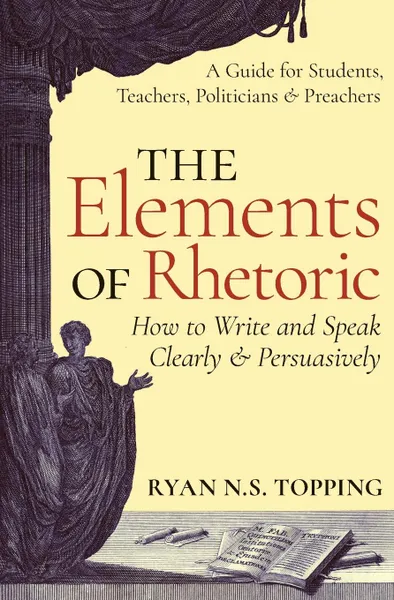The Elements of Rhetoric. How to Write and Speak Clearly and Persuasively -- A Guide for Students, Teachers, Politicians . Preachers 12+
Автор: Ryan N.S. Topping
116 страниц
Категория: Учебная литература
ISBN: 9781621381969
Язык: Английский
📗 The Elements of Rhetoric offers a concise, comprehensive course in the rules for making your point stick. With copious examples from such masters of language as Cicero, Augustine, Shakespeare, Erasmus, Lincoln, Dickens, Newman, Chesterton, and Lewis, you will discover the 26 rules of persuasion and learn to apply them. Among the Elements you'll find:
--The three modes of persuasion
--How to structure an academic essay
--How to spot and avoid logical fallacies
--How to compose with literary figures
--Practical tips for improving speed in composition
--A Study Guide with exercises
This is the essential guide to persuasive writing and speaking, in the tradition of Strunk and White's The Elements of Style.
"Ryan Topping has produced a guide accessible and useful to those of all ages and experience levels, in the classroom, the political setting, and the pulpit."--Joseph R. Wood, Institute of World Politics
"This is a splendid introduction to what you need to know to communicate wisely and well."--Quentin Schultze, Calvin College, author of An Essential Guide to Public Speaking
"The Elements of Rhetoric is that rarest of rhetorical treats: a playfully serious and seriously playful summa of the art of communication--classical education at its very best!"--Raymond F. Hain, Providence College
"Leading by example, Topping delivers a handy guide for all of us who rely on the art of persuasion. The Elements of Rhetoric is a gem."--Daniel B. Coupland, Hillsdale College, co-author of Well-Ordered Language: The Curious Child's Guide to Grammar
"This is the book I have sought for 35 years. For those like me, for whom public speaking and writing is their stock-in-trade, this book is a must-have daily companion."--Michael C. Gilleran, Business & IP Trial Lawyer & Partner, Burns & Levinson, LLP, Boston, MA
"This versatile guide can supplement course material from any discipline in order to help students polish presentations and essays."--ANN MARIE KLEIN, Department of Catholic Studies, University of St. Thomas, MN
Ryan N.S. Topping earned a doctorate in Theology from The University of Oxford and is a Fellow of Thomas More College of the Liberal Arts. He has published several books on education and Christian culture.
--The three modes of persuasion
--How to structure an academic essay
--How to spot and avoid logical fallacies
--How to compose with literary figures
--Practical tips for improving speed in composition
--A Study Guide with exercises
This is the essential guide to persuasive writing and speaking, in the tradition of Strunk and White's The Elements of Style.
"Ryan Topping has produced a guide accessible and useful to those of all ages and experience levels, in the classroom, the political setting, and the pulpit."--Joseph R. Wood, Institute of World Politics
"This is a splendid introduction to what you need to know to communicate wisely and well."--Quentin Schultze, Calvin College, author of An Essential Guide to Public Speaking
"The Elements of Rhetoric is that rarest of rhetorical treats: a playfully serious and seriously playful summa of the art of communication--classical education at its very best!"--Raymond F. Hain, Providence College
"Leading by example, Topping delivers a handy guide for all of us who rely on the art of persuasion. The Elements of Rhetoric is a gem."--Daniel B. Coupland, Hillsdale College, co-author of Well-Ordered Language: The Curious Child's Guide to Grammar
"This is the book I have sought for 35 years. For those like me, for whom public speaking and writing is their stock-in-trade, this book is a must-have daily companion."--Michael C. Gilleran, Business & IP Trial Lawyer & Partner, Burns & Levinson, LLP, Boston, MA
"This versatile guide can supplement course material from any discipline in order to help students polish presentations and essays."--ANN MARIE KLEIN, Department of Catholic Studies, University of St. Thomas, MN
Ryan N.S. Topping earned a doctorate in Theology from The University of Oxford and is a Fellow of Thomas More College of the Liberal Arts. He has published several books on education and Christian culture.
Мнения
